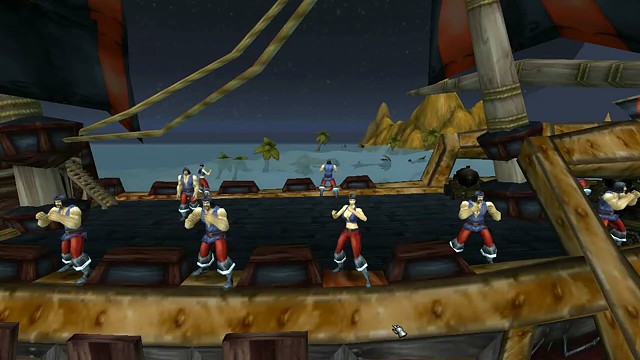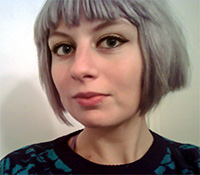Performing in Public (Four Years of Ephemeral Actions in World of Warcraft) |
||
|
||
|
DESCRIPTION/ABSTRACT: Artist and UC San Diego alumna Angela Washko (MFA Visual Art '15) is featured in a solo exhibition, Performing in Public (Four Years of Ephemeral Actions in World of Warcraft), the fall show in the gallery@calit2 that will continue into early December. For the past four years, the artist has been creating performances inside the most popular and highest-grossing multiplayer online video game of all time: World of Warcraft (WoW). Operating under performative stage titles including The Council on Gender Sensitivity and Behavioral Awareness in World of Warcraft, and The World of Warcraft Psychogeographical Association, Washko says she "began to think of World of Warcraft as less of a game and more as a massive, networked public social space. Looking at WoW through this new lens, I began to create a series of actions or performative gestures responding to both the social and representative 'physical' environment." 
In Performing in Public (Four Years of Ephemeral Actions in World of Warcraft), Washko presents the broad array of actions she created in WoW for the first time as a large body of work. Although individual works from Washko's experiments in World of Warcraft have been presented at venues including Kiasma Museum of Contemporary Arts (Helsinki, Finland), Shenzhen Independent Animation Biennial (Shenzhen, China), Campbelltown Arts Center (Sydney, Australia), Vox Populi Gallery (Philadelphia, PA), Hudson Valley Center for Contemporary Art (Peekskill, NY), Tenerife Espacio de last Artes (Tenerife, Spain) SPRING/BREAK Art Fair (NYC), Vector Game and Art Convergence (Toronto, Canada), University at Buffalo, New York University, Austin Peay State University, Marymount University, Momenta Art (NYC), and Microscope Gallery (NYC), this is the first time that Washko's performative interventions in WoW will be shown in their entirety. "I've never been able to show all of the gestures I've produced in WoW as one body of work centered on treating the game space as a context for performance rather than a fixed game/tech/digital object," notes the artist. For example, when Washko operated as The Council on Gender Sensitivity and Behavioral Awareness in World of Warcraft...instead of killing enemies and getting increasingly impressive equipment like she had done previously as a player, she started traveling to highly populated areas of the game to create discussions among other players. The discussions initially focused on the exclusionary, sexualized and aggressive social conditions women faced within the game space at the time of the project’s inception. “This led to longer discussions about feminism among a myriad of other unexpected topics with players from geographically varied places meeting together in this virtual but spatial and representative, corporatized public space," adds Washko. "The conversations I have facilitated are documented and reproduced in videos and images online and presented in both art institution and gaming-oriented contexts." When she assumes the identity of The World of Warcraft Psychogeographical Association, Washko engages in play that is not encouraged or rewarded by the developers of World of Warcraft -- play that involves wandering the landscape in search of ways to interact with it outside of the quests for which the landscape and social culture were designed. "This process has resulted in endurance performances for (physical) live audiences that last as long as 12 hours," explains Washko. "Over the course of the typical day spent as The World of Warcraft Psychogeographical Association, I follow players' paths, encourage players to share with me parts of the landscape they find most interesting, explore WoW’s vast continents, dance with animal AI, avoid engaging in combat, jump from beautiful waterfalls, die repeatedly by ignoring designed limitations, fly to the moon, and contemplate this epic digital world of which much is now completely useless to gameplay and no longer navigated by other players due to gameplay restructuring designed for faster and more efficient leveling trajectories to keep players paying monthly. " Washko's experiments in World of Warcraft have been supported in part by Franklin Furnace Archive, and the Terminal Award for Internet Art. A comprehensive essay on the work has been commissioned and published by Creative Time Reports. Please RSVP to Trish Stone at tstone@ucsd.edu. SPEAKER BIO: ANGELA WASHKO is an artist, writer and organizer devoted to creating new forums for discussions of feminism in the spaces most hostile toward it. She is currently a Visiting Assistant Professor at Carnegie Mellon University. In 2012, Washko founded The Council on Gender Sensitivity and Behavioral Awareness in World of Warcraft as an ongoing intervention inside the most popular MMORPG of all time. A recipient of a Franklin Furnace Performance Fund Grant, a Creative Time Report commission, and a Rhizome Internet Art Microgrant, Washko’s practice has been highlighted in Art in America, Frieze Magazine, Time Magazine, The Guardian (UK), ArtForum, ARTnews, VICE, Hyperallergic, Rhizome, the New York Times, The Creator’s Project, Art Monthly, Neural and other media. Her projects have been presented nationally and internationally at venues including the Milan Design Trienniale, Kiasma Museum of Contemporary Art (Helsinki, Finland), Los Angeles Museum of Contemporary Art, Moving Image Art Fair (London and NYC), the Rotterdam International Film Festival, and Institute for Contemporary Art Boston. In 2015 Washko earned her MFA in Visual Art from UC San Diego, where she also lectured in the Interdisciplinary Computing and the Arts (ICAM) program. http://angelawashko.com/ Moderator BENJAMIN H. BRATTON is an Associate Professor of Visual Arts at UC San Diego, and Director of the Center for Design & Geopolitics in Calit2's Qualcomm Institute. Bratton works at the intersections of contemporary social and political theory, computational media and infrastructure, as well as architectural and urban design problems and methodologies. Current research interests include: the philosophical problematics of the interfaciality, digital urbanism & media architecture, contemporary continental philosophy & aesthetic theory, institutional technology transfer protocols and platforms, design research management & methodologies, classical and contemporary sociological theory, history of the social sciences, organizational theory, and interaction and interface design. Bratton has lectured widely, and is the author of many articles and book chapters in academic and popular publications. Bratton has published widely, from AD:Architectural Design and Volume to BlackBook and Theory, Culture and Society, He has been a visitiing lecturer and critic at Columbia, Pratt, Yale, Architectural Association of London, Penn, USC, UCLA, Art Center College of Design, Michigan, Brown, the University of Applied Arts in Vienna, among others. He was also co-chair of ambient:interface, the 54th (and final) International Aspen Design Conference. Bratton is also a frequent advisor and consultant to public and private organizations. He is the former Director of Advanced Strategies at Yahoo!, and former Director of Information Architecture at Razorfish. Panelists JURGEN SCHULZE is a Research Scientist in the Qualcomm Institute and an Adjunct Professor in the Computer Science and Engineering department, both at UC San Diego. Dr. Schulze teaches CSE 167 (Introduction to Computer Graphics) and CSE 165 (3D User Interfaces) and runs independent study projects in his laboratory at the Qualcomm Institute. His research interests include scientific visualization, immersive virtual environments, human-computer interaction, real-time volume rendering, and mobile devices for graphics applications. Schulze holds an M.S. degree from the University of Massachusetts and a Ph.D. from the University of Stuttgart, Germany. After Stuttgart he spent two years as a postdoctoral researcher in computer science at Brown University, before joining the Qualcomm Institute at UC San Diego in 2005. AMY ALEXANDER is a digital media, audiovisual and performance artist who has also worked in film, video, music, tactical media and information technology. She has been making films since 1990 and creating art through programming since 1994. Much of Alexander’s work is performance-based, often working at intersections of cinema, performing arts, humor, politics, and popular culture. Her current research and practice focuses on expanded approaches to the moving image that reflect contemporary cultural and technological shifts. Alexander has performed and exhibited internationally in clubs and on the street as well as in festivals, museums and on the Internet. She has written and lectured on software art, software as culture, and audiovisual performance, and she has served as a reviewer for festivals and commissions for digital media art, video, and computer music. She was a founding organizer of the runme.org software repository, and she has done residencies at The Media Centre in Huddersfield, UK, and the iotaCenter for visual music in Los Angeles. She is an Associate Professor of Visual Arts at the University of California, San Diego. http://amy-alexander.com MORE INFORMATION: The artist discussion and reception are open to the public, free of charge. |


